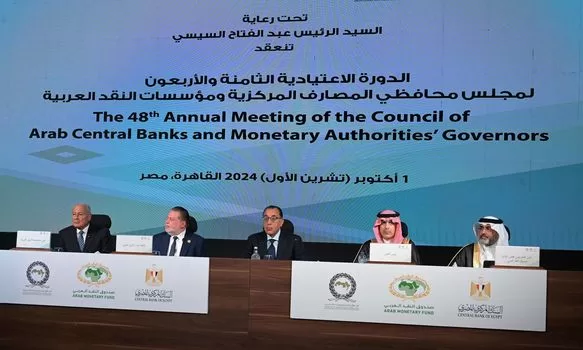Egypt’s Prime Minister Moustafa Madbouli said that geopolitical crises posed real challenges to the state governments, a matter that necessitated devising modern methods and approaches to address them.
Speaking at the opening session of the 48th ordinary session of the Council of Arab Central Banks and Monetary Authorities’ Governors, Madbouli conveyed President Abdel Fattah El Sisi’s greetings to the participants.
He further noted the convocation of this session comes under unfavorable regional and international circumstances.
He added the repercussions of successive crises are intertwined with geopolitical developments and cast a shadow on many aspects of life.
This presents unconventional challenges to the state governments, particularly in the Arab region, a matter that require devising modern methods and approaches that take into account various factors, influences and variables, Madbouli said.
These methods should focus on the social dimension, Madbouli said, stressing the need for close cooperation between those in charge of establishing economic policies and regional and international financial institutions.
Madbouli said the consequences of these tensions led to inflationary waves, a matter that necessitated making tangible changes in the arrangement of economic policies, topped by the monetary policy, which tended towards a successive increase in interest rates to curb inflation rates.
This matter had unfavorable repercussions on the global economic growth and development financing in most developing countries and emerging market economies, particularly in light of the investment gap required to achieve the 2030 Sustainable Development Goals (SDGs), he said, adding that over 4 trillion dollars are needed to close the global financing gap, according to UN estimates.
It is expected that the labor markets will witness some radical transformations due to the rapid changes and developments in modern electronic technologies, Madbouli further noted.
The International Monetary Fund (IMF) stated that 40% of traditional jobs worldwide may be affected by increasing reliance on AI applications, Madbouli said.
Madbouli said that in spite of all these serious challenges and successive changes, the global economy has shown resilience and cohesion in the face of falling into the cycle of economic stagnation (is a prolonged period of slow economic growth as measured by gross domestic product (GDP)).
He also underlined that the central banks around the world raised interest rates to contain inflation that affected the performance of many economic sectors, particularly international trade.
He added that he is cautiously optimistic about the possibility of achieving stability and underlying improvement in the global economy projections.
The International Monetary Fund (IMF) estimates showed the growth rate of the global economy will reach 3.2% in 2024 and 3.3% in 2025, which is an indicator of a state of relative stability in the global economy performance, however these rates remain lower than their average in the previous years before the outbreak of the COVID-19 pandemic, the premier said.
Egypt, with its geographical and political location, is an integral part of all regional and international interactions, and as it has its influence and interventions, it is also affected by various variables and data, the premier said.
He stressed that the Egyptian government was keen on rising to these successive challenges with the support of the political leadership of President Abdel Fattah El Sisi and adopting the necessary policies to address these challenges.
Egypt also continued its path towards implementing structural reforms that support growth and employment, and encouraging the private sector to contribute to national economy
He cited the launch of the State Ownership Policy Document, with the aim of boosting the private sector’s participation in output, employment, investments and exports, a matter that helped the Egyptian economy to withstand the complex and intertwined crises witnessed by the global economy.






Discussion about this post